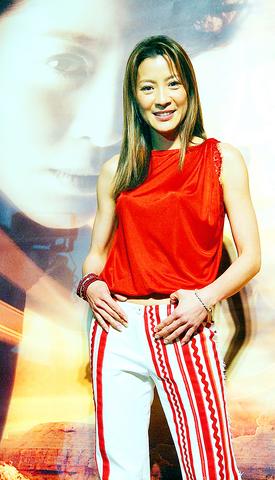Dressed in bright red, Michelle Yeoh (
Yeoh should be happy. For the past two weeks she and her boyfriend and co-producer, Thomas Chung, have been touring China's major cities from Beijing to Wuhan and Chengdu, promoting the film. The result looks satisfying. In the two weeks after its release in China, the film reached a box office tally of 17 million renminbi, which surpassed the Chinese box office sales of Spiderman and Star Wars: Episode II.
"My feelings shifted from being extremely nervous to excited and now I feel really happy and relaxed," Yeoh said at a press conference on Wednesday.

PHOTO: SHEN CHAO-LIANG, TAIPEI TIMES
Standing beside her, Pater Pau (
"She was the typical Chinese woman in Crouching Tiger, repressing her feelings towards her beloved and her anger towards her enemy," Pau said. "In Tomorrow Never Dies, she was too cool and serious." So in The Touch, Pau said the audience will see the true Michelle Yeoh, who likes to laugh and make jokes. There are also kisses with Ben Chaplin in the film.
The Touch is one of the few Hong Kong-produced films with a budget over US$20 million. Investors in the film include Hong Kong, Japan and Taiwan. "Chinese filmmaking is now beginning to change its face from small-budget kung fu films to bigger and bigger productions," Pau said. "Touch is among the first ones to make this change," he added.
Helen Huang (黃寶雲), chairperson of Pandasia Entertainment, is the film's Taiwanese investor. Her company put up nearly one-third of the film's budget. "Enterprises in Taiwan do have the willingness and the vision to invest in films with international appeal," she said. "The film is a good example of this."
The Touch sees many former Crouching Tiger actors and crew members, including late Taiwanese actor Lung Sihung (郎雄), who came to fame playing the father figure in most of Ang Lee's (李安) films. The Touch was Lung's last film and perhaps his most difficult as, at age 72, he had to memorize his lines in English. He plays a Tibetan monk in the film.

On April 26, The Lancet published a letter from two doctors at Taichung-based China Medical University Hospital (CMUH) warning that “Taiwan’s Health Care System is on the Brink of Collapse.” The authors said that “Years of policy inaction and mismanagement of resources have led to the National Health Insurance system operating under unsustainable conditions.” The pushback was immediate. Errors in the paper were quickly identified and publicized, to discredit the authors (the hospital apologized). CNA reported that CMUH said the letter described Taiwan in 2021 as having 62 nurses per 10,000 people, when the correct number was 78 nurses per 10,000

As we live longer, our risk of cognitive impairment is increasing. How can we delay the onset of symptoms? Do we have to give up every indulgence or can small changes make a difference? We asked neurologists for tips on how to keep our brains healthy for life. TAKE CARE OF YOUR HEALTH “All of the sensible things that apply to bodily health apply to brain health,” says Suzanne O’Sullivan, a consultant in neurology at the National Hospital for Neurology and Neurosurgery in London, and the author of The Age of Diagnosis. “When you’re 20, you can get away with absolute

May 5 to May 11 What started out as friction between Taiwanese students at Taichung First High School and a Japanese head cook escalated dramatically over the first two weeks of May 1927. It began on April 30 when the cook’s wife knew that lotus starch used in that night’s dinner had rat feces in it, but failed to inform staff until the meal was already prepared. The students believed that her silence was intentional, and filed a complaint. The school’s Japanese administrators sided with the cook’s family, dismissing the students as troublemakers and clamping down on their freedoms — with

As Donald Trump’s executive order in March led to the shuttering of Voice of America (VOA) — the global broadcaster whose roots date back to the fight against Nazi propaganda — he quickly attracted support from figures not used to aligning themselves with any US administration. Trump had ordered the US Agency for Global Media, the federal agency that funds VOA and other groups promoting independent journalism overseas, to be “eliminated to the maximum extent consistent with applicable law.” The decision suddenly halted programming in 49 languages to more than 425 million people. In Moscow, Margarita Simonyan, the hardline editor-in-chief of the